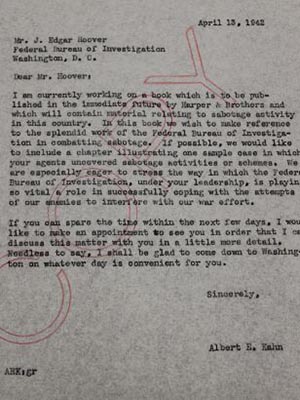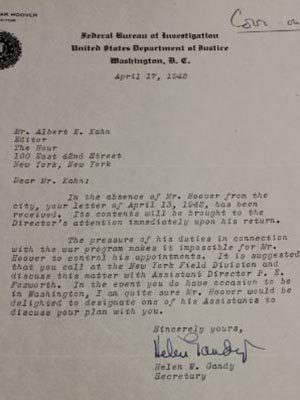Albert Eugene Kahn Papers
November 30, 2012
Description by Bonnie McBride, Archives and Special Collections Intern and Simmons College MS candidate in Library and Information Science
 The Albert Eugene Kahn papers, recently processed, consist of 2.5 linear feet of materials primarily related to the 1942 book “Sabotage! The Secret War Against America,” by Albert E. Kahn and Michael Sayers. The majority of the collection dates from 1941-1943 and comprises primary-source research materials, such as newspapers and first-person accounts, used by Kahn in writing “Sabotage!” In addition to the research materials, the collection contains a manuscript galley copy of “Sabotage!,” correspondence, publicity materials for “Sabotage!” and a limited amount of materials relating to the political newsletter, The Hour, and the unpublished book, “The White Paper.”
The Albert Eugene Kahn papers, recently processed, consist of 2.5 linear feet of materials primarily related to the 1942 book “Sabotage! The Secret War Against America,” by Albert E. Kahn and Michael Sayers. The majority of the collection dates from 1941-1943 and comprises primary-source research materials, such as newspapers and first-person accounts, used by Kahn in writing “Sabotage!” In addition to the research materials, the collection contains a manuscript galley copy of “Sabotage!,” correspondence, publicity materials for “Sabotage!” and a limited amount of materials relating to the political newsletter, The Hour, and the unpublished book, “The White Paper.”
 Left, Michael Sayers; Right, Albert Kahn
Left, Michael Sayers; Right, Albert Kahn
Albert Eugene Kahn was born May 11, 1912 in London; he was educated in the United States, graduating from Dartmouth College in 1932. In 1934, he married Henriette Warner and moved to California. At the height of the Great Depression, Kahn volunteered to lead an ambulance tour to raise money for Loyalist forces fighting in the Spanish Civil War. It was during this tour that he was exposed to the vast economic differences around the country, which greatly affected him, and in 1938 he joined the Communist Party of the United States. In 1939 Kahn was named editor of The Hour, a newsletter that worked to expose Nazi espionage, sabotage and propaganda operations in the United States. In the late 1940s, Kahn was blacklisted from mainstream publishing in the United States as a result of his outspoken opposition to the Cold War. He continued writing political works, along with biographies and memoirs, until his death of a heart attack on September 17, 1979.
 As editor of the The Hour, an anti-fascist newsletter produced for the use of news editors, columnists and radio commentators, Kahn became acquainted with Michael Sayers. Together they proposed writing a book detailing the actions of the America First Committee, an isolationist committee formed to advocate to keep the United States out of World War II; as it grew, the group came to have members with Nazi ties and Nazi sympathies. Many of the primary-source materials in the collection at Brandeis are related to Kahn’s investigation of the America First Committee, including newsletters, lists of members and first-person accounts of meetings. The book was to be titled “The White Paper;” however, it was never published, as the America First Committee was dissolved shortly after the bombing of Pearl Harbor and the entry of the United States into war.
As editor of the The Hour, an anti-fascist newsletter produced for the use of news editors, columnists and radio commentators, Kahn became acquainted with Michael Sayers. Together they proposed writing a book detailing the actions of the America First Committee, an isolationist committee formed to advocate to keep the United States out of World War II; as it grew, the group came to have members with Nazi ties and Nazi sympathies. Many of the primary-source materials in the collection at Brandeis are related to Kahn’s investigation of the America First Committee, including newsletters, lists of members and first-person accounts of meetings. The book was to be titled “The White Paper;” however, it was never published, as the America First Committee was dissolved shortly after the bombing of Pearl Harbor and the entry of the United States into war.
 Kahn and Sayers had already signed a contract for a book with Harper & Bros, and the collection includes their correspondence back and forth as they decide with the publisher their next work. Out of the research conducted for The Hour came “Sabotage! The Secret War Against America,” published in 1942. Kahn detailed acts of sabotage committed in the United States by Japanese and German saboteurs, psychological sabotage, fifth column activities and acts of counter-sabotage conducted by the government, along with a chapter devoted to the America First Committee. “Sabotage!” was an immediate best seller when first published, with Harper & Bros quickly selling out of the first printing. However, its run was short-lived; documents in the collection show discussions relating to slashing the price to move remaining copies and repackaging the remaining copies as “Victory Editions.”
Kahn and Sayers had already signed a contract for a book with Harper & Bros, and the collection includes their correspondence back and forth as they decide with the publisher their next work. Out of the research conducted for The Hour came “Sabotage! The Secret War Against America,” published in 1942. Kahn detailed acts of sabotage committed in the United States by Japanese and German saboteurs, psychological sabotage, fifth column activities and acts of counter-sabotage conducted by the government, along with a chapter devoted to the America First Committee. “Sabotage!” was an immediate best seller when first published, with Harper & Bros quickly selling out of the first printing. However, its run was short-lived; documents in the collection show discussions relating to slashing the price to move remaining copies and repackaging the remaining copies as “Victory Editions.”
 The Albert Eugene Kahn papers contain materials documenting the creation of “Sabotage!” all the way through its publication. The original contract signed by Kahn and Sayers is a part of the collection, along with statements regarding their royalties and expenses. The publicity materials contain copies of advertisements promoting “Sabotage!” in industry publications along with those seen by the general public. Kahn also kept newspapers containing advertisements or reviews of his book, and it appears that he subscribed to a clipping service that made sure he would not miss a mention of either himself or his book. All the illustrations used in “Sabotage!” are found in the collection, many as photostats, and the original illustrations used in the book are marked up or pasted onto a page indicating where they belong in the book. The collection also contains a manuscript galley copy of “Sabotage!” along with an advance copy of the Reader’s Digest volume that contains an excerpt.
The Albert Eugene Kahn papers contain materials documenting the creation of “Sabotage!” all the way through its publication. The original contract signed by Kahn and Sayers is a part of the collection, along with statements regarding their royalties and expenses. The publicity materials contain copies of advertisements promoting “Sabotage!” in industry publications along with those seen by the general public. Kahn also kept newspapers containing advertisements or reviews of his book, and it appears that he subscribed to a clipping service that made sure he would not miss a mention of either himself or his book. All the illustrations used in “Sabotage!” are found in the collection, many as photostats, and the original illustrations used in the book are marked up or pasted onto a page indicating where they belong in the book. The collection also contains a manuscript galley copy of “Sabotage!” along with an advance copy of the Reader’s Digest volume that contains an excerpt.
 Included in the correspondence are letters sent by Kahn to various government officials, including J. Edgar Hoover, both asking for assistance and informing them of the publication of his book. Kahn was diligent about answering his “fan mail,” and it is interesting to read the letters sent to him and the copies of his replies. Many of the letters thank him for bringing awareness to the topic of sabotage in the United States, and one comes from a serviceman on guard duty against sabotage asking for a copy of the book so his unit would know more about the enemy they are fighting. Also in the correspondence are letters of complaint, some of which threatened legal action. At least one reader did proceed with a libel suit, as indicated in the folder “Materials related to libel case.”
Included in the correspondence are letters sent by Kahn to various government officials, including J. Edgar Hoover, both asking for assistance and informing them of the publication of his book. Kahn was diligent about answering his “fan mail,” and it is interesting to read the letters sent to him and the copies of his replies. Many of the letters thank him for bringing awareness to the topic of sabotage in the United States, and one comes from a serviceman on guard duty against sabotage asking for a copy of the book so his unit would know more about the enemy they are fighting. Also in the correspondence are letters of complaint, some of which threatened legal action. At least one reader did proceed with a libel suit, as indicated in the folder “Materials related to libel case.”
 The Albert Eugene Kahn papers are a treasure trove for researchers interested either in sabotage occurring in the United States preceding and during World War II or in the America First Committee, because of its extensive newspaper collection and primary-source documents obtained by Kahn for his own research.
The Albert Eugene Kahn papers are a treasure trove for researchers interested either in sabotage occurring in the United States preceding and during World War II or in the America First Committee, because of its extensive newspaper collection and primary-source documents obtained by Kahn for his own research.

